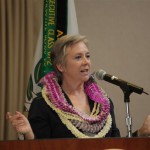Remarks by
Ambassador (Retired) Lauren Kahea Moriarty
Dean of Academics
College of Security Studies
Asia-Pacific Center for Security Studies
Honolulu, Hawai’i – September 2, 2010
Aloha! General Smith, thank you for that gracious introduction—and thank you for hiring me!
Many of my finest mentors, teachers and role models are here on this day of celebration for me.
Senator Inouye, Senator Akaka, thank you for being here today. Thank you for inspiring me over the years.
My dad, David Peters, who served his country for thirty years as an Army officer and the people of Hawai’i for another three decades, my wonderful husband Jim, who is the U.S. Ambassador to Bangladesh, my closest friend and the love of my life, my daughter Kanani, who is a Peace Corps Volunteer in Yap, Micronesia, and other members of my family have supported and helped me every day of my life. They are represented here today by my sister Diane Peters-Nguyen, my son Mana Moriarty and his fiancée Sarah Wong. I love you, guys.
Thank you, too, to the others with us here or with us in spirit who have helped me chart my course in life, guided me along the way, and showed me how to serve. If I named everyone, we would be here all day, but know that I appreciate you.
My mother Melekahana Peters gave me the beautiful Hawaiian name “Kaheaokekai.” It means, “The call of the sea.” I was called across the sea to serve my country in faraway lands and to have great adventures. I was called home, back to Hawai’i.
Why did I choose to take this job as Dean of Academics at the Asia-Pacific Center for Security Studies? Because I have always been passionate about the importance of education and because I believe in the mission of this center.
APCSS’s mission is to educate, empower and connect security practitioners to advance security in the Asia-Pacific region.
When we ask those who participate in our courses, conferences and workshops what security means, foreign and U.S. participants define a comprehensive concept. They say that “security” encompasses economic security and good governance. They see as threats to security the things we usually think of when we think of the word “security”: territorial disputes and nuclear weapons, terrorism and piracy, political, ideological and ethnic differences. But they also see pandemic disease and natural disaster, illegal immigration and poverty, corruption and climate change as threats to security. They see the tools by which we advance our security as, yes, bombs and missiles and soldiers and sailors, but also as trade and international collaboration; as good laws, public trust and a whole-of-government-approach; as understanding other people’s culture, history and religion, other nation’s interests and aspirations.
Our fine faculty at APCSS distills and presents to busy practitioners the latest in current thinking and research on security issues and the Asia-Pacific region. The faculty facilitates discussion as practitioners work together, critiquing and helping each other with their own real-world experience to identify issues, approaches and opportunities.
Here in Hawai’i, security practitioners sit in our seminar rooms or on the lanai, away from the ringing phones of busy offices. They call each other by first name, without rank and protected by Chatham House rules of non-attribution. They produce amazing results.
Similarly, overseas, APCSS lays academic groundwork and helps bridge bureaucratic stovepipes to advance security in the real world. Security practitioners working together—sometimes from a single country, sometimes from several countries—produce real results.
I saw the results first-hand when I lived and worked overseas.
Nepal, for example, was writing a new constitution as part of the country’s transformation from a monarchy to a republic. APCSS brought together for the first time parliamentarians, politicians and the military to discuss among themselves what it meant for a civilian government to exercise authority over the military and how to embody that concept in the new constitution. In countries where I lived and visited, I saw first-hand how active, APCSS alumni organizations continued to connect alumni across agency lines and international borders.
I’ll bet that many of you many of you here today had little idea when you came of the fascinating and important work that APCSS does. I am fortunate to serve as Academic Dean at this special place and to be part of what APCSS does here and throughout the Asia-Pacific region.
To fellow academics here today, I look forward to working with you. To security practitioners, I hope to see you in a class or a workshop. To the wonderful faculty and staff of APCSS, thank you for professionalism, expertise and enthusiasm. To all here today, thank you for this warm welcome.
Aloha.







Contgratulations Lauren! I have followed your career from afar, albeit though the Web. Blessings to you and best wishes for your continued success.
Jeanne
Wurzzburg American High School
Class ’72
Great! Congratulation! More success is waiting for you Ambassador Lauren Kahea Moriarty. Wish you all the best.
Shahiduzzaman, Bangladesh